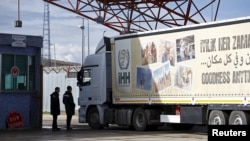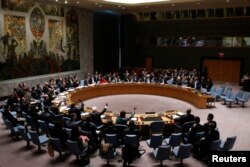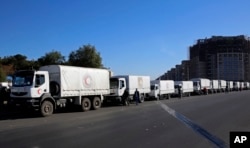The U.N. Security Council approved cross-border aid deliveries to Syria for another year Tuesday, despite some concerns from Russia.
The renewed authorization will help the United Nations and its partners get life-saving aid to more than three million people in northern and southern parts of the war-torn country.
The resolution was adopted with a vote of 13 in favor and three abstentions - Russia, China and Bolivia.
The Russian envoy, Vladimir Safronkov, said when the council mandated cross-border deliveries in 2014, it was intended as a temporary measure, implemented during a heightened phase of the armed conflict.
"Today the situation in the country has changed radically and the mechanism for cross-border deliveries remains a legacy of the past," he told council members. "We think it is important to gradually roll down this rudimentary scheme which has worked for Syria's division."
U.N. humanitarian chief Mark Lowcock welcomed the continuation of the measure in place since 2014, saying cross-border deliveries are a vital part of the humanitarian response in Syria, where 13 million people are in need of assistance.
"More than 650 trucks have this month delivered food assistance to over 900,000 people through cross-border operations, as well as health assistance for nearly one million treatments," Lowcock told the council.
Sweden, which along with Egypt and Japan co-sponsored the resolution, said the extended mandate would save lives and alleviate suffering.
"It is not every day that this council takes decisions that have a direct impact on the people affected by conflict," Swedish ambassador Oloof Skoog said. "Today is such a day."
But as the council heard Tuesday, aid access continues to be problematic, erratic and insufficient, particularly in areas classified as besieged and hard to reach.
"In November, only five cross-line convoys were able to deploy, reaching 200,250 people in hard-to-reach locations and 28,700 people in besieged locations out of a total besieged population of more than 400,000 people," the humanitarian chief reported. "So far in December, none — none — of our convoys have made it to any of the besieged locations."
"Who can seriously argue that the humanitarian situation in Syria has improved?" French envoy François Delattre noted to reporters. "When we renewed this resolution last year, 10 million people in Syria needed humanitarian aid. Today they are 13 million."
Eastern Ghouta
The situation is particularly dire in Eastern Ghouta, which lies about 15 kilometers east of Damascus. Despite being designated as one of four de-escalation zones where hostilities were to be suspended for six months, the U.N. says that except for a pause of two days, there have been intensive air and ground-based strikes daily since mid-November.
Government forces are besieging nearly 400,000 people in the rebel-controlled enclave and only tiny amounts of aid have been allowed in. The U.N. says that acute malnutrition rates among children in Eastern Ghouta are the highest recorded in Syria since the start of the conflict seven years ago.
Aid chief Lowcock said 500 people require urgent medical evacuation, including 137 children. Sixteen civilians have died waiting for the government to authorize their transfer to a Damascus hospital, just a 30-minute drive away.
"The Syrian government's 'starve-or-surrender' tactics aimed at besieged civilians across the country are not only war crimes but are like a nightmare from the Middle Ages," Louis Charbonneau, U.N. director at Human Rights Watch, said in a statement.






